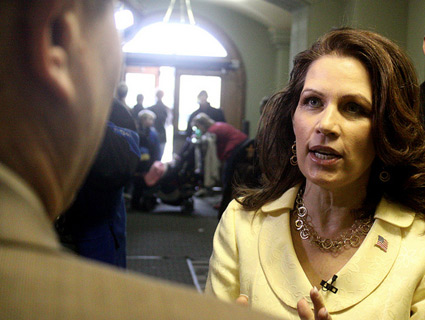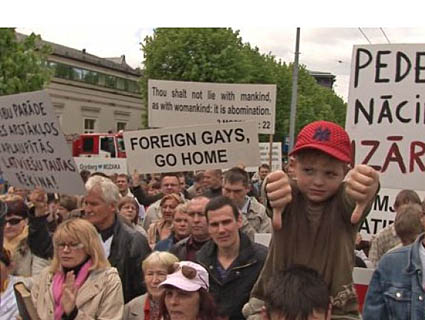
Rep. Michele Bachmann (R-MN)<a href="http://www.flickr.com/photos/gageskidmore/5555182360/">Gage Skidmore</a>/Flickr
The first was TJ. Then came Samantha, Aaron, Nick, and Kevin. Over the past two years, a total of nine teenagers have committed suicide in a Minnesota school district represented by Rep. Michele Bachmann—the latest in May—and many more students have attempted to take their lives. State public health officials have labeled the area a “suicide contagion area” because of the unusually high death rate.
Some of the victims were gay, or perceived to be by their classmates, and many were reportedly bullied. And the anti-gay activists who are some of the congresswoman’s closest allies stand accused of blocking an effective response to the crisis and fostering a climate of intolerance that allowed bullying to flourish. Bachmann, meanwhile, has been uncharacteristically silent on the tragic deaths that have roiled her district—including the high school that she attended.
Bachmann, who began her political career as an education activist, has described gay rights as an “earthquake issue,” and she and her allies have made public schools the front lines of their fight against the “homosexual agenda.” They have opposed efforts in the state to promote tolerance for gays and lesbians in the classroom, seeing such initiatives as a way of allowing gays to recruit impressionable youths into an unhealthy and un-Christian lifestyle.
But in 2008, when Michele Johnson and her daughter, Samantha, moved from rural North Dakota into the 38,000-student Anoka-Hennepin school district, the largest in Minnesota, they had no idea they were landing on ground zero of that culture war. Coming from a rural small town, Samantha barely knew what the word gay meant when she arrived at Fred Moore Middle School (now Anoka Middle School for the Arts) as a seventh-grader. But by the fall of 2009, the 13-year-old was at the epicenter of the public school fight over gay rights.
She was among a group of students who pushed the district to allow them to start a gay-straight alliance club (GSA). Such groups have been vehemently opposed by religious conservatives, who have dubbed them gay “sex clubs.” The club was designed to give both LGBT and straight kids a supportive environment from which to combat harassment and a place to learn coping skills. The students had approached a theater teacher, Jefferson Fietek, who agreed to be the group’s staff adviser. The club was supposed to convene for the first time in September 2009, but Fietek says that the school district balked, claiming to need more time to vet the club with “legal.”
The first meeting was postponed until October, when the district stalled again. Fietek finally decided to hold a meeting in November anyway, without the district’s approval. But Samantha wasn’t there for it.
Even as she was helping to start the GSA, her world was falling apart. Always a good student, Samantha was failing all her classes. She dropped out of volleyball. Michele was frantically trying to help her only child. She begged a school counselor to keep an eye on her. She took Samantha to a therapist. But Samantha was depressed for reasons Michele didn’t fully understand.
In November, Samantha started to cheer up, and Michele started to think she had turned a corner. Over Veterans Day weekend, she bought Samantha some new clothes, which, to her surprise, were a hit. On Veterans Day, they made plans to play football in the backyard and to grill outside. Michele and her boyfriend, John, went to the store to rent a movie and pick up some food. When they pulled into the driveway a half-hour later, John heard the gun shot.
Inside, Samantha had taken off the new clothes her mother had bought her and changed into some old stuff. She had lain down in the bathtub and put a hunting rifle in her mouth. A single bullet went through the back of her head. “There was no saving her,” Michele says through tears.
It was only much later her mother began to piece together what had been going on in Samantha’s life in the days before she died. Samantha had always been partial to wearing sweats and she wore her hair short. She played softball and volleyball, and she was chubby. Kids had been harassing her on the assumption that she was a lesbian. But Michele says her daughter wasn’t gay. Samantha did seek refuge with kids who were, in part, her mother suspects, because they, too, were singled out for bullying at school.
Samantha’s friends told Michele that some of the girls from the volleyball team had basically been stalking her, waiting until Samantha was out of view of the security cameras, and teasing her about her clothes, her weight, her hair. Samantha tried to cope on her own. One day she wore girly clothes. That just resulted in more abuse. Samantha’s friends told Michele that such bullying had been witnessed at least once by school staff member, who did nothing to intervene.
“If I had known, I would have pulled her out of that school so quick,” Michele says. But no one told her. Even when Samantha stopped going to volleyball practice, the coach never contacted her mother.
Fietek, too, has been devastated by Samantha’s death. “She would have been at the first meeting [of the GSA] if we had been allowed to meet when we were supposed to meet,” says Fietek. “There’s always the ‘what if’ thing. I wish we would have been given the opportunity to reach out to her. There are many incidents where kids have come to the group and said that what they learned there saved my life.”
Samantha’s death was among the first in a wave of suicides and attempted suicides that plagued this district for the next two years. At least four of the suicides involved kids known or at least perceived by their peers to be LGBT. Since January, seven of Fietek’s students at Anoka Middle School have been hospitalized for attempting or threatening suicide.
There’s no sure way of knowing why any of the kids took their own lives, but gay rights activists quickly honed in on one factor they saw as contributing to an unhealthy climate for at-risk kids. Anoka-Hennepin has a policy on the books known colloquially as “no homo promo,” which dates in back to the mid-1990s. Back then, after several emotional school board meetings, the district essentially wiped gay people out of the school health curriculum. There could be no discussion of homosexuality, even with regard to HIV and AIDS, and the school board adopted a formal policy that stated school employees could not teach that homosexuality was a “normal, valid lifestyle.”
Later the policy was changed to require school staff to remain neutral on issues of homosexuality if they should come up in class, a change that critics said fostered confusion among teachers and contributed to their inability to address bullying and harassment, or to even ask reasonable questions about some of the issues the kids were struggling with, like sexual orientation. Both policies were put into place at the behest of conservative religious activists who have been among Bachmann’s biggest supporters in the district. They include the Minnesota Family Council (MFC), and its local affiliate, the Parents Action League, which has lobbied to put discredited “reparative therapy” materials in schools. Samantha Johnson
Samantha Johnson
If you or someone you know is in crisis and considering suicide, please call the Trevor Lifeline for LGBT youth at (866) 4-U-Trevor or the National Suicide Prevention Lifeline at (800) 273-TALKThat’s the sort of counseling reportedly practiced by Bachmann & Associates, the mental health clinics run by Michele Bachmann’s husband, Marcus. The clinics reportedly counsel people on how to “pray away the gay” to become straight. Before entering politics, Bachmann served as the education advisor to the MFC-affiliated Minnesota Family Institute, a relationship she has continued. This spring, she headlined a fundraising dinner for MFC, along with Newt Gingrich.
The MFC has waged a seven-year battle to pass a constitutional amendment to ban gay marriage that will be on the state ballot in 2012. In the Minnesota Legislature, Bachmann was at the forefront of this issue. In 2004, she appeared on the steps at the state capital at a rally supporting a ban on gay marriage and linked the issue to the public schools, telling the crowd, “In our public schools, whether they want to or not, they’ll be forced to start teaching that same-sex marriage is equal, that it is normal and that children should try it.”
Teachers and counselors in the district, as well as civil rights activists, say that Bachmann’s closest allies like the MFC have helped create a vitriolic climate in the wake of the teen suicides in the Anoka-Hennepin area that may have hampered the community’s ability to effectively address what was, at root, a serious mental health crisis. Following the deaths and the publicity about bullying and anti-gay sentiments, the school district became inflamed with nasty infighting over whether promoting anti-bullying efforts was simply a cover for advancing the homosexual agenda in schools.
“It was very distracting,” says Daniel J. Reidenberg, the executive director of the Minnesota-based Suicide Awareness Voices of Education (SAVE) who has been involved with the school district in addressing the suicide contagion. He notes that the anti-gay rhetoric after the suicides was potentially harmful to at-risk kids.
Last year, as the teen suicides prompted local discussion about how to prevent more deaths, and gay rights groups honed in on the school district’s “neutrality” policy, religious conservatives formed a new group to preserve the policy and fight what they viewed as the undue influence of homosexuals in the schools. The Parents Action League, headed by Minnesota Family Council researcher Barb Anderson, wrote on its website that one of the group’s major concerns was the gay-straight alliance at Anoka Middle School. The Parents Action League has been fighting the GSA ever since, and Anderson has taken to the airwaves and local op-ed pages to blame parents and gay activists for the rash of suicides.
In June, she wrote to a local paper:
Why aren’t we outraged that the GSAs affirm sexual disorders? (i.e. homosexual attractions and behavior which for men is built around the practice of anal sex—the leading cause of HIV)…GSAs imply that homosexual behavior is acceptable and even cool. Homosexual-friendly books tell students that bisexuality, sexual fluidity and experimentation are OK.
Open your eyes, people. Parents, do you really want your children attending a GSA where homosexual behavior is affirmed and celebrated and where children are trained to be advocates for this unhealthy behavior as well as activists for gay rights?
Tom Prichard, the head of the MFC, told the Minnesota Independent in October that his group would continue to fight anti-bullying efforts in the Anoka-Hennepin schools, saying that the suicides were not the product of anti-gay bulling but rather “homosexual indoctrination.” Prichard said students like Samantha died because they adopted an “unhealthy lifestyle,” and that “homosexual activists” were manipulating the suicides to further advance their agenda in the school district.
Bachmann ally Bradlee Dean, the head of the heavy-metal ministry You Can Run But You Cannot Hide International, last year took to the radio to decry efforts to create a more tolerant climate in the public schools. “We were just talking about the homosexual indoctrination,” Dean said. “The state-run media is going after the schools for resisting the homosexual indoctrination. The homosexuals are now blaming—they are playing the victims—the homosexuals are now blaming [the schools’] stance as the reason that young homosexuals are committing suicide because of the schools’ intolerance to the lifestyle of homosexuality.” Another one of Bachmann’s longtime allies, Janet Boynes, an “ex-gay” who works with the ministry Exodus International, has also joined the fight. In May, she spoke at an Anoka-Hennepin school board meeting supporting the neutrality policy.
Throughout all of this, Bachmann has remained uncharacteristically quiet. Her office did not respond to a request for comment. But she is on the record opposing anti-bullying legislation. In 2006, Bachmann attended a hearing on an anti-bullying bill in the state legislature and voiced her opinion that bullying was simply a fact of life.
She told state lawmakers: “I think for all us our experience in public schools is there have always been bullies, always have been, always will be. I just don’t know how we’re ever going to get to point of zero tolerance and what does it mean?…What will be our definition of bullying? Will it get to the point where we are completely stifling free speech and expression? Will it mean that what form of behavior will there be—will we be expecting boys to be girls?”
As civil rights groups have pushed the Minnesota school district to do more to increase tolerance of LGBT students, conservative religious groups fought to keep them away from public schools. After Samantha’s suicide and several others, students in Anoka-Hennepin schools participated in the Day of Silence. The event, organized by the Gay Lesbian Straight Education Network, encourages kids to remain silent for the day in recognition of the effect of anti-gay bullying and harassment. In response, religious activists took up the “Day of Truth,” an event championed by the “ex-gay ministry” Exodus International that’s usually held the day before the Day of Silence. Students who participated were encouraged to engage their classmates in discussions of homosexuality from a Christian perspective.
Fifteen-year-old Justin Aaberg appears to have been one of the targets of this initiative. One day last year Justin came home and told his mom, Tammy, that another student had told him he would to go to hell because he was gay. “That did something to his brain,” she says. He hanged himself in his bedroom last summer. Only after his suicide did Tammy learn that the Parents Action League had reportedly worked with area churches to hand out T-shirts promoting the “Day of Truth” to students at his high school (which is also Bachmann’s alma mater). The students were also instructed to “preach to the gay kids,” Aaberg says. (No one from the Parents Action League responded to a request for comment.)
The anti-gay climate in the schools in Bachmann’s district has been so extreme that it has attracted the attention of the Justice Department and the Department of Education’s Office of Civil Rights, which are both investigating allegations of anti-gay bullying. The Southern Poverty Law Center has also been on the ground investigating discrimination against gay students. On Thursday, it sued the school district over its “neutrality” policy, which the group views as a potential violation of the equal protection clause of the Constitution. In a letter to the district superintendent in May, SPLC wrote:
The gag policy bears no rational relationship to any legitimate governmental purpose. On the contrary, the history surrounding the policy’s enactment clearly shows that the policy was adopted solely in deference to some community members’ disapproval of, and animus toward, a particular class of citizens—LGBT people. The law is clear that mere animus toward an unpopular group cannot constitute a legitimate governmental purpose.
The letter describes the plight of LGBT students, several of whom had been harassed physically and verbally for long periods of time. According to the SPLC, the students reported the harassment to school officials, who ignored the complaints. One of the plaintiffs eventually dropped out of school and later attempted suicide. Another student, who’d been reporting anti-LGBT harassment for two years, was advised by the school district to find another school because they couldn’t protect him. A third student claims that after he was violently assaulted and called a “faggot” in the hallway, a teacher stood by and watched without intervening. After he reported the incident, the school official blamed him for provoking the attack.
Sam Wolfe, the staff attorney working on the suit, says, “One of our clients got stabbed in the neck with a pencil in the bathroom. The district has serious problems. They’ve been reluctant to really address the nature of the problem.”
Tammy Aaberg has been lobbying public officials to do more to change the tenor of the dialogue and to pass legislation that would make the schools safer. She says Sen. Al Franken (D-Minn.) and Rep. Keith Ellison (D-Minn.) have both been supportive; Franken has introduced federal legislation that would require school districts to protect LGBT students. Bachmann, however, has been a ghost on the issue. Aaberg requested a meeting with the congresswoman to discuss Franken’s safe schools legislation but says she got no response.
Such legislation will come too late for Justin—for TJ, Aaron, Nick, Kevin, July, Justin, and Cole. It will come too late for Jordan, who took his life in May. Too late for Samantha, as well.
Now, Michele Johnson watches the school bus pass her home every day without her daughter on it. She weeps as she talks about never having grandchildren, or the opportunity to help her daughter get a driver’s license. “I wish we had never moved here,” she says. “I feel if I hadn’t moved to this district my daughter wouldn’t have died.”
UPDATE: If you or someone you know is in crisis and is considering suicide call the National Suicide Prevention Lifeline at 1-800-273-TALK (8255) or the Trevor Project Lifeline for LGBT youth at 1-866-488-7386. The hotline is free, confidential, and runs 24 hours a day, 7 days a week.
















